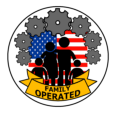



Tahoma Specialty Pest Services
1818 W. Francis Ave #333
Spokane, Wa. 99205-6834
(509) 978 7830
1.png)
The friendly Honey Bee is generally not a pest; however, they can cause issues
for which you many need help. During the spring, at times as early as February,
and all the way into summer in the Puget Sound region, the bees are in “swarm
season.” On nice days, especially after a rainstorm, you may find groups of
Honey bees hanging out in a tree or maybe the side of your roof. Don’t panic,
this is normal behaviour for bees. Tahoma Pest Management is your solution!
Our partner organization Craig Family Honey Farms, 
 will take care of removing
the swarm, often at little or no cost to you! If you have an established colony of
bees in your home we can take care of that as well. Please avoid harming
Honey Bees, and enjoy having them around.
will take care of removing
the swarm, often at little or no cost to you! If you have an established colony of
bees in your home we can take care of that as well. Please avoid harming
Honey Bees, and enjoy having them around.

 will take care of removing
the swarm, often at little or no cost to you! If you have an established colony of
bees in your home we can take care of that as well. Please avoid harming
Honey Bees, and enjoy having them around.
will take care of removing
the swarm, often at little or no cost to you! If you have an established colony of
bees in your home we can take care of that as well. Please avoid harming
Honey Bees, and enjoy having them around.
These ferocious hunters are not hornets, in fact, they are Wasps, It probably
won’t matter to you what they are though if you’ve run over one of their
ground nests with your lawn mower or when they’ve started building one of
their trademark basketball-sized nests on the side of your house. These nasty
fighters have barbless stingers and are capable of repeat stinging. Sadly, for
our friendlier Honeybees, they have gotten a bad rap because many people
believe they have been stung by a Honeybee when, in fact, Yellow Jacket
Wasps were the likely culprits. Late into summer and fall, Yellow Jackets can
become particularly aggressive. Most consumer brand pesticide products are
ineffective at eliminating these pests, mostly because of their enclosed hive
structure. This paper-like layered enclosure is impossible to penetrate without
disturbing the inhabitants, and you will probably get stung in the process…a
lot. Fortunately, Tahoma Pest Management has the tools and talent to keep
these Yellow Jacket Wasps away.
Paper Wasps are generally passive and will sting only if provoked. However,
they can be just as unfriendly as the related Yellow Jacket. The nests of Paper
Wasps are interesting to watch…if you dare go close enough. Unlike Yellow
Jackets, the Paper Wasp builds an open style hive. This means that you can see
most of the goings-on inside. Chances are they’ve made a home within the eves
or overhangs of your house or maybe even the attic. If Paper Wasps are
causing you trouble, make sure to give Tahoma Pest Management a call and do
not try to take care of the issue yourself. Paper Wasps can be very good
predators of other pest insects, but they can also become good predators of you
if they are disturbed.
Bald-Faced Hornets can be some of the most aggressive stinging insects in the
Puget Sound region. These hornets are known to have guards that patrol the
exterior of the hive and they will quickly warn others when threats approach.
These mean meat-eating bugs are best left to the professionals to take care of.
Mason Bees are native to North America, and often go un- noticed by people. In
the early Spring, before many other species of bee have started coming out, the
Mason Bee is already at work. In our region these harmless little bees are
exceptional pollinators of cherry, apple, and other early blooming fruit trees.
Although capable of stinging, you would be hard pressed to ever find one of
these stinging someone. Despite their docile nature they can cause alarm for
some, especially if you notice them going into holes in your house’s siding.
Unlike Honey Bees who have large colonies, Mason Bees are solitary dwellers.
They make their home in little openings about 6mm in diameter and 6” deep.
They will select natural openings that they find, and do not create openings
themselves. However, if you want to help them, Mason Bee houses are very
easy to make and directions are plentiful online. If you can, leave these bees
alone and enjoy having them around.
Stinging Insects
Honey Bee
Yellow Jacket Wasp
Paper Wasp
Bald-Faced Hornet
Blue Orchard Mason Bee


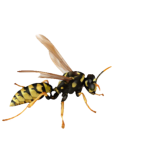

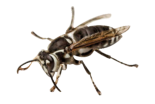














Tahoma Specialty Pest Services
1818 W. Francis Ave #333
Spokane, Wa. 99205-6834
(509) 978-7830
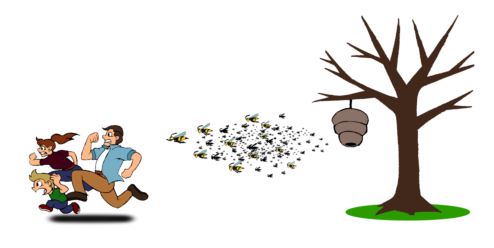
Stinging Insects
The friendly Honey Bee is generally not a pest;
however, they can cause issues for which you
many need help. During the spring, at times as
early as February, and all the way into summer in
the Puget Sound region, the bees are in “swarm
season.” On nice days, especially after a
rainstorm, you may find groups of Honey bees
hanging out in a tree or maybe the side of your
roof. Don’t panic, this is normal behaviour for
bees. Tahoma Pest Management is your solution!
Our partner organization Craig Family Honey
Farms, will take care of removing the swarm,
often at little or no cost to you! If you have an
established colony of bees in your home we can
take care of that as well. Please avoid harming
Honey Bees, and enjoy having them around.
These ferocious hunters are not hornets, in fact,
they are Wasps, It probably won’t matter to you
what they are though if you’ve run over one of
their ground nests with your lawn mower or
when they’ve started building one of their
trademark basketball-sized nests on the side of
your house. These nasty fighters have barbless
stingers and are capable of repeat stinging.
Sadly, for our friendlier Honeybees, they have
gotten a bad rap because many people believe
they have been stung by a Honeybee when, in
fact, Yellow Jacket Wasps were the likely
culprits. Late into summer and fall, Yellow
Jackets can become particularly aggressive. Most
consumer brand pesticide products are
ineffective at eliminating these pests, mostly
because of their enclosed hive structure. This
paper-like layered enclosure is impossible to
penetrate without disturbing the inhabitants,
and you will probably get stung in the process…a
lot. Fortunately, Tahoma Pest Management has
the tools and talent to keep these Yellow Jacket
Wasps away.
Paper Wasps are generally passive and will sting
only if provoked. However, they can be just as
unfriendly as the related Yellow Jacket. The nests
of Paper Wasps are interesting to watch…if you
dare go close enough. Unlike Yellow Jackets, the
Paper Wasp builds an open style hive. This means
that you can see most of the goings-on inside.
Chances are they’ve made a home within the eves
or overhangs of your house or maybe even the
attic. If Paper Wasps are causing you trouble,
make sure to give Tahoma Pest Management a
call and do not try to take care of the issue
yourself. Paper Wasps can be very good predators
of other pest insects, but they can also become
good predators of you if they are disturbed.
Bald-Faced Hornets can be some of the most
aggressive stinging insects in the Puget Sound
region. These hornets are known to have guards
that patrol the exterior of the hive and they will
quickly warn others when threats approach.
These mean meat-eating bugs are best left to the
professionals to take care of.
Mason Bees are native to North America, and
often go un-noticed by people. In the early
Spring, before many other species of bee have
started coming out, the Mason Bee is already at
work. In our region these harmless little bees are
exceptional pollinators of cherry, apple, and
other early blooming fruit trees. Although
capable of stinging you would be hard pressed to
ever find one of these stinging someone. Despite
their docile nature they can cause alarm for
some, especially if you notice them going into
holes in your house’s siding. Unlike Honey Bees
who have large colonies, Mason Bees are solitary
dwellers. They make their home in little openings
about 6mm in diameter and 6” deep. They will
select natural openings that they find, and do not
create openings themselves. However, if you
want to help them, Mason Bee houses are very
easy to make and directions are plentiful online.
If you can, leave these bees alone and enjoy
having them around.
Honey Bee
Yellow Jacket Wasp
Paper Wasp
Bald-Faced Hornet
Blue Orchard Mason Bee



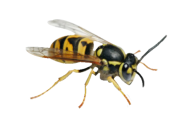









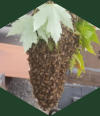
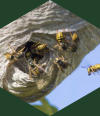
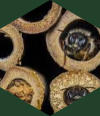
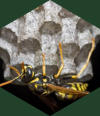
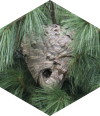











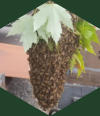
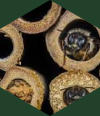
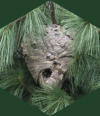





















.png)
.png)




